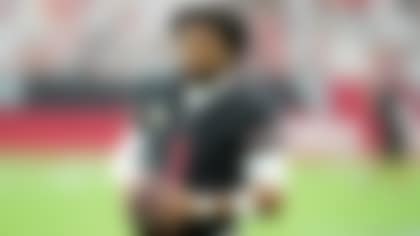With his knee stitched shut and his ligaments back intact, Adrian Peterson remained in a deep sleep as the anesthesia kept the Minnesota Vikings running back in a rare state of sedation.
His doctor, the doctor, esteemed orthopedic surgeon James Andrews, wasn't about to wait for Peterson to wake up before informing Peterson's parents about one of the most phenomenal knees he'd ever seen.
So Andrews found the parents, who had just watched the surgery from an observation room in Andrews' medical center in Birmingham, Ala., and provided an explanation that perhaps foreshadowed the miraculous recovery ahead.
"I can't believe it," Andrews told them, in a conversation recalled by Peterson's father, Nelson, during a phone interview with NFL.com. "For this guy to have played as much football as he's played his whole life, and not to have hardly any wear and tear, it's incredible. I've never seen a football player, especially one who runs and cuts as much as he does, with a knee in that condition. It's like a newborn baby."
Less than 11 months later, those first four words from Andrews' lips can be used to sum up how the entire sports world has reacted to Peterson's incredible journey back to the top spot among the NFL's rushing leaders: Can anyone believe this?
As we digest what brought about this reality -- whether it was genetics or work ethic or improved rehabilitation methods -- we can ask a similar question about several other rapidly recovering players around the NFL, like Kansas City Chiefs running back Jamaal Charles. After suffering serious knee injuries, Peterson and Charles seem to be returning to form at a point when the rest of us would just be ditching the crutches.
Survival instinct
As Peterson continues on a career-best pace that currently has him leading the NFL in rushing, he said he's heard more questions about his recovery with each gained yard.
"People keep asking if I'm surprised by this," Peterson said during a phone interview. "No, I'm not. At all. A lot of people are surprised because they don't have the same mindset as me, the same belief process, the same faith.
"But it doesn't surprise me."
To truly grasp Peterson's mindset, consider what happened just hours after he awoke from surgery, six days after he'd torn the anterior cruciate ligament and medial collateral ligament in his left knee. His doctors entered his room to see how he was doing. They told him he had the option of staying in bed or, if he really wanted, attempting to stand up with the help of crutches.
"Most guys stay in bed -- they want some time to rest," said Peterson's father, who was also in the room.
"They'll wait until the next morning before they take that option. Adrian says, 'Sure, I'll try it.' Right there, hours after surgery, he stands up and puts his foot to the ground."
When players talk about their injuries, many say the same thing: Their recovery begins with the fear that they'll never get to play football again. It eats at them, they say. Then, it fuels their efforts to make unorthodox and unprecedented recoveries.
The fear was initially crippling for Charles, the Chiefs' star running back who tore the ACL in his left knee in the second week of the 2011 season. As he rode on the back of a medical cart toward the underbelly of Ford Field in Detroit with his dreadlocked head buried in his hands, he literally thought he might have seen his last down.
"I just wondered if I was going to get the chance to play football again -- if I was ever going to come back," Charles said during a phone interview this week. "When something happens like that, you don't know what it is. But you know something is wrong. It's really a heartbreaking feeling.
"You're doing something that you really love and you can't do it anymore."
Not long after, Charles found himself consumed by his recovery. He was spending three hours every morning -- then three more hours in the afternoon -- dedicated to nothing but his surgically repaired knee.
Peterson said he was the same way. After his injury, doctors suggested he wait for the swelling in his knee to subside before undergoing surgery. But that would take too much time, and Peterson didn't want to waste any of it. So he purchased an ice therapy machine to expedite the process -- and he was being operated on just days later.
"There were times when I didn't want to do a lot of stuff," Peterson said. "I just wanted to rest because I was sore, but I would just get up and push through it. My mother always taught me, 'When you leave to go home at the end of the day, you need to feel like you accomplished something.' So I would fight through it."
Something special
It would be narrow-minded to suggest that work ethic is the only factor at play here. After all, plenty of players in NFL history have fallen victim to knee injuries despite possessing a strong work ethic.
Former Denver Broncos running back Terrell Davis tore his ACL and MCL in 1999, then played two more unproductive and incomplete seasons before retiring. Atlanta Falcons running back Jamal Anderson went to a Pro Bowl in 1998, but a torn ACL ended his career three years later. There are many other players who were never the same after suffering a knee injury.
Simply returning to action in a full calendar year is still considered an impressive feat. So how is it that, after getting back on the field in less time than that, Charles and Peterson are both among the 10 most productive runners of the 2012 season?
"Give credit to the doctor -- he did a great job going into my knee and doing what he does," Peterson said. "But I just feel like I'm different -- my family and my genetics. Just how my body is built."
It's certainly possible we could simply be dealing with a freak example when it comes to Peterson's greatness. The doctor compared his knee to that of a newborn, after all, a pretty incredible analogy in itself.
"Except," as Peterson detailed, "a newborn doesn't have a knee cap. I guess that was the only difference."
So perhaps, then, Peterson's exceptional play -- which has clearly surpassed even Charles' performance -- can indeed be credited to his superhuman muscular composition. But both players have also benefited from improved rehabilitation programs and advances in technology.
"I think I took care of my leg more than I ever did before," Charles said. "Since then, I take care of both of my legs better than I ever have. I do everything right. I eat the right food, do the proper stretches, use the proper equipment. I just try to take care of my body much better now."
The best is yet to come?
When Peterson was making a run against the Seattle Seahawks earlier this month, he felt something crack in his knee. He knew he hadn't aggravated last season's injury, but he still wondered about it. So he asked his physicians.
As he learned, it was nothing more than scar tissue breaking up in his knee. It has happened on a few other occasions -- proving that Peterson's road to recovery is actually still taking a toll on his body.
"I've felt myself getting stronger and better each time some of that tissue around the patella breaks up," Peterson said. "I've noticed a little soreness after it happens, but once I've recovered, it's felt more flexible and just looser in that area."
So is Peterson fully back to his old form?
"There are some small things I can notice that nobody else would ever notice," Peterson said. "The strength of my left leg isn't as strong as I'd want it right now. I want to be more explosive and quicker. Those are the things I look forward to achieving."
As this magical season continues for Peterson -- and as Charles' own recovery helps validate the advancements made in knee surgeries
-- it's hard to imagine how much better he could possibly get during a season in which he has already defied so much logic.
Then again, on the very day Peterson came out of surgery, his surgeon made it clear he couldn't fathom what he was seeing then, either. Maybe it's time we all grew accustomed to these freakish accomplishments. After all, if Peterson can believe it, why shouldn't we?
"This is something that I had planned out months ago," Peterson said. "I knew I wanted to come into this season and have an impact. I wanted to help my team. I'm not surprised by what I've done. I expected it the whole time, and I think that's the reason it's happening."
Follow Jeff Darlington on Twitter @JeffDarlington.











